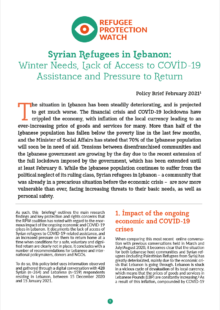Syrian Refugees in Lebanon
February 4, 2021
Winter Needs, Lack of Access to COVID-19 Assistance and Pressure to Return
Download 334.12 kb
This briefing outlines the enormous impact of the ongoing economic and COVID-19 crises in Lebanon. It documents the lack of access of Syrian refugees to COVID-19-related assistance, and an increased pressure on them to return home at a time when conditions for a safe, voluntary and dignified return are clearly not in place.
It’s based on a round of conversations RPW (of which PAX is one of the organizations) had with 428 Syrian and Lebanese respondents between 15 December 2020 and 15 January 2021. Some of the findings:
- Lack of income: for 83.8% and 77% of Lebanese and Syrian respondents, respectively, their income does not cover the cost of living. Furthermore, it should be noted that with the winter season in full swing, almost none of RPW’s respondents (only 4.6%) reported being able to purchase winter essentials (i.e. fuel and winter clothing).
- Lack of jobs and work permits: almost a third of respondents (28.8% of Lebanese respondents and 29.8% of Syrian respondents) cannot find available jobs in their area. 43.8% of Syrian respondents still face issues with obtaining a work permit.
- Lack of protection against COVID-19: against the background of ongoing discriminatory practices against Syrian refugees in the distribution of COVID-19 assistance, 88.2% of all respondents reported not having access to proper COVID-19 treatment or healthcare should they contract the virus.
- Lack of access to COVID-19 vaccine: while the Lebanese Ministry of Public Health has recently stated that the vaccine will be distributed to everyone on an equal basis, the most recent registration form put forward by the MoPH for the WHO-sponsored COVAX vaccination programme in Lebanon requires that any Syrian who wishes to register for the vaccine should have a form of valid documentation. It remains to be seen what kind of priority refugees will be given within the COVAX campaign, and how accessible it will be in terms of location, as most Syrian refugees live in and around more sub-urban and rural areas.
- Pressure to return: 74.4% of Syrian respondents reported feeling increased pressure to return to Syria. This increased return pressure takes place against the backdrop of efforts to start organising large-scale returns – including the recent organisation of a “return conference” in Damascus and the development of a “return plan” by the GoL- at a time when conditions for safe, voluntary and dignified return are clearly not in place, as previously reported by RPW and many other actors.





